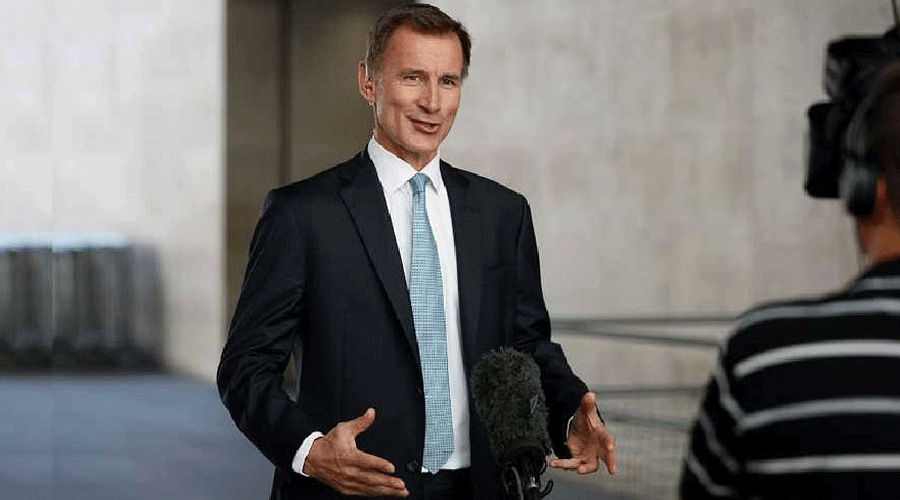Rishi Sunak was vindicated in dramatic fashion on Monday when Britain’s new chancellor, Jeremy Hunt, ripped up the economic policies on which Liz Truss was elected Tory party leader and prime minister.
With Truss sitting next to him, Hunt outlined his plans in greater detail to the Commons, when he announced the government would be advised by an independent four member panel that would include Sushil Wadhwani, who was an Indian member of the Bank of England’s Monetary Policy Committee from June 1999 to May 2002. He did his schooling from Mayo College, Ajmer, and his further education at Stanmore Sixth Form College. He is also the founder and chief executive officer of Wadhwani Asset Management.
As an increasing number of Tory MPs came out publicly for Truss to step down immediately, Hunt made an emergency statement and later addressed the Commons in an attempt to calm the markets.
Hunt, who took over when Kwasi Kwarteng was sacked, said in his statement: “We will reverse almost all the tax measures announced in the growth plan three weeks ago that have not started parliamentary legislation.”
He announced the planned 1p cut in the basic rate of income tax will be put on hold indefinitely and remain 20 per cent. The energy price guarantee, a central plank in Truss’s policies, will no longer last two years – it will last until April next year and then be reviewed to save money and better target support. VAT-free shopping for visitors and alcohol duty freeze will both be scrapped.
Hunt justified going back to the policies Rishi had advocated, especially his warning that unfunded tax cuts would spook the markets and cause chaos.
“The most important objective for our country right now is stability,” said Hunt, whose statement was well received by the markets.
But he warned: “There will be more difficult decisions, I’m afraid, on both tax and spending as we deliver our commitment to get debt falling as a share of the economy over the medium term.”
In a tweet, Truss gave no indication she accepted blame for pursuing unfunded tax cuts – and not taking heed of the warnings Rishi had repeatedly given that she was “divorced from reality”.
The “Prime Minister In Name Only” (PINO), as Truss is now being called, said: “The British people rightly want stability, which is why we are addressing the serious challenges we face in worsening economic conditions. We have taken action to chart a new course for growth that supports and delivers for people across the United Kingdom.”
The BBC’s political editor, Faisal Islam, commented: “We have witnessed an utterly extraordinary un-budget, perhaps marking the biggest U-turn in British economic history….We may need new terminology. ‘U-turn’ suggests a controlled manoeuvre. This is like a plane trying to do the jet engine equivalent of a handbrake turn.”
Chris Mason, the BBC’s political editor, agreed: “The Truss programme for government is dead. Nearly every element of her prospectus has just been shredded by her new chancellor.”
Nick Eardley, the BBC’s chief political correspondent, reported: “A former cabinet minister has told me Hunt’s economic statement just now confirmed that Truss ‘is a goner, it put it beyond any doubt. What is the point of Liz Truss? That is the question... there is literally no point.’ ”
In the Daily Telegraph, which backed Truss for leader, columnist Nick Timothy, former Downing Street chief of staff to Theresa May, summed up: “Liz Truss is doomed. The only question now is who will take over. And so Conservative MPs are asking what is the point of Truss without Trussonomics? It is a rhetorical question: while in public few admit that the Prime Minister is a busted flush, in private almost all know she is doomed. The conversations in Parliament are not about if Truss can survive, but how to remove her and who should take over.”
Tory MPs are trying to work out how best to remove Truss.
George Osborne, the former Conservative chancellor, told Channel 4 “there will be a way” to force Truss’s exit. “Both Boris Johnson and Theresa May were removed outside of the rules of the 1922 (backbench) committee. So I wouldn’t spend too much time worrying about those rules. I think the 1922 committee, or indeed a large number of MPs, can just force the issue. So water will find its way downhill.”
According to the Financial Times, “Hunt is seen as the frontrunner to succeed Truss, thanks to his show of loyalty in steadying the government after Kwarteng’s departure and his calm media performances.”
But the paper reported: “Supporters of Rishi Sunak, former chancellor, have been phoning MPs this week to gauge the situation. ‘The conversations suggest they’re laying the groundwork for another run,’ one said.”
Among Tory MPs who have asked Truss to go is Jamie Wallis, from the 2019 intake, who said in his letter to the Prime Minister: “I ask you to stand down as Prime Minister as I believe you no longer hold the confidence of the country or the parliamentary party.”










